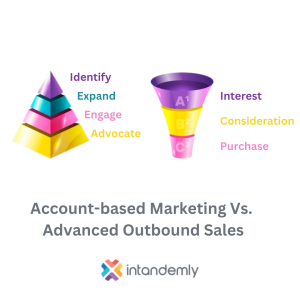Account Based Marketing Vs Advanced Outbound Sales
Introduction
In this blog, we will delve deeper into the concept of Account Based Marketing Vs Advanced Outbound Sales and explore its benefits, strategies, and best practices. We will also discuss how ABM can help companies achieve their marketing and sales goals, and provide examples of successful ABM campaigns.
Whether you are new to Account Based Marketing or looking to optimize your existing strategies, this blog will provide you with knowledge on What is account-based marketing?
At its core, Account Based Marketing is essentially advanced outbound sales. Rather than casting a wide net and hoping to catch the attention of potential customers, ABM targets specific accounts that are likely to be a good fit for the product or service being offered. This allows for a more targeted approach that is more likely to result in successful sales.
What is Outbound Marketing?
Outbound is disruptive by nature because it seeks out prospects and may at times make a lead feel bombarded and turned off by the information that has been put in their face. This is why it is sometimes called interruption marketing.
Account Based Marketing Vs Advanced Outbound Sales

| Factor | Outbound Sales | Account-Based Marketing |
| Focus | Casting a wide net to find leads | Targeting specific high-value accounts |
| Messaging | Generic messaging for all leads | Personalized messaging for each account |
| Sales Cycle | Shorter, more transactional | Longer, more relationship-focused |
| Approach | Reactive, waiting for leads to come | Proactive, reaching out to targeted accounts |
| Resource Allocation | Spread out across many leads | Focused on high-value accounts |
| KPIs | The Volume of leads generated | Conversion rates for targeted accounts |
Which is The Better for Your Business, Outbound or ABM?
Key benefits of Account-Based Marketing (ABM)
- Focuses on high-value accounts that are more likely to convert, resulting in a higher return on investment (ROI)
- Personalized messaging and campaigns create a more positive and memorable experience for the target accounts
- Allows for more efficient use of resources by targeting specific high-value accounts instead of casting a wide net
- Helps to build stronger relationships with customers through a more personalized approach
- Improves the alignment between sales and marketing teams by targeting accounts that both teams agree are high-priority
- Provides valuable insights into the specific needs and pain points of target accounts, which can be used to improve product or service offerings
- This leads to increased customer satisfaction, loyalty, and retention by providing a more tailored experience for each account
- Enables the creation of more focused and effective marketing campaigns by targeting specific accounts with personalized messaging and content
- Helps to shorten the sales cycle by providing targeted accounts with the information they need to make a purchasing decision
- Results in higher conversion rates by focusing on high-value accounts that are more likely to be a good fit for the product or service being offered.
Reasons why you should consider implementing an Account Based Marketing (ABM) strategy:
Focus on high-value accounts:
ABM enables you to focus your resources on a smaller set of high-value accounts, which can lead to better ROI and higher conversion rates.
Personalized experiences:
With Account Based Marketing, you can deliver personalized experiences to decision-makers at target accounts, which can increase engagement and build stronger relationships.
Alignment between sales and marketing:
ABM requires close alignment between sales and marketing teams, which can improve communication, increase efficiency, and lead to better outcomes.
Improved targeting:
Account Based Marketing relies on data and analytics to identify high-value accounts and track engagement, which can lead to more targeted and effective outreach.
Better ROI:
By focusing on high-value accounts and delivering personalized experiences, ABM can lead to better ROI and increased revenue for your business.
Long-term relationships:
ABM is focused on building long-term relationships with high-value accounts, which can lead to repeat business, referrals, and increased customer lifetime value.
Competitive advantage:
Account Based Marketing is a relatively new and innovative approach to marketing and sales, which can give your business a competitive advantage in your industry.
Increased customer satisfaction:
By delivering personalized experiences and building long-term relationships, ABM can lead to increased customer satisfaction and loyalty.
How Can ABM and Outbound Amplify Conversions?
Basically, you can use Outbound’s direct approach to reach lots of leads and gather as much insight about them, and then fine-tune your strategy by pulling together your resources and going after each individual in the DMU (decision-making unit) based on the information that you have gathered.
6 Keys to ABM Success for B2B
Identify high-value accounts:
The first step in ABM’s success is identifying the accounts that are most likely to convert and provide the highest value. This involves working closely with sales and marketing teams to identify the ideal customer profile and targeting accounts that fit that profile.
Personalize messaging and campaigns:
Once high-value accounts have been identified, it's important to create personalized messaging and campaigns that are tailored to the specific needs and pain points of each account. This may involve creating custom content or developing targeted advertising campaigns.
Build relationships:
Account Based Marketing is a relationship-building approach that involves working closely with target accounts to understand their needs and provide value over time. This requires a longer-term focus on relationship-building and providing ongoing support and value to target accounts.
Align sales and marketing teams:
Account Based Marketing requires close collaboration between sales and marketing teams to ensure that both teams are aligned on the target accounts and the messaging and campaigns being developed. This alignment is critical to ABM's success.
Measure and optimize:
As with any marketing approach, it's important to measure the success of Account Based Marketing Vs Advanced Outbound Sales campaigns and optimize them over time. This involves tracking key metrics such as conversion rates, customer lifetime value, and customer retention and using that data to refine future campaigns.
Use the right technology:
Account Based Marketing requires a combination of technology tools to be successful, including customer relationship management (CRM) software, marketing automation software, and targeted advertising platforms. It's important to choose the right technology stack to support your Account Based Marketing efforts and ensure that they integrate seamlessly with each other.
Also Read: Ultimate Guide of Account Based Marketing With Outbound Marketing
Conclusion
Account Based Marketing Vs advanced outbound sales strategy that can lead to increased sales, higher customer lifetime value, and improved customer retention. By targeting high-value accounts with personalized campaigns and messaging, businesses can create a more effective and efficient sales strategy. When combined with outbound sales tactics, Account Based Marketing can help businesses identify and convert high-value accounts more effectively.
